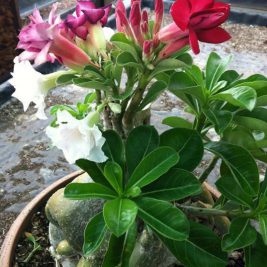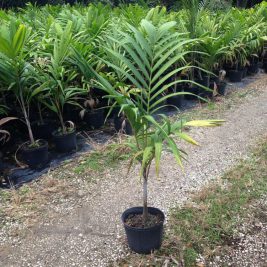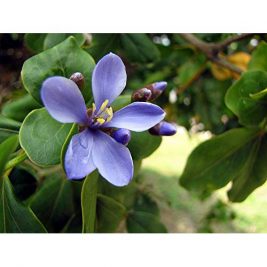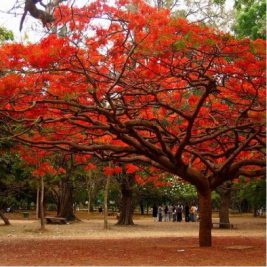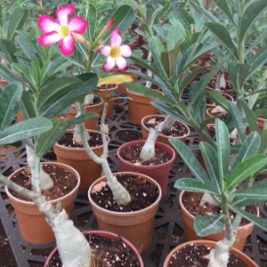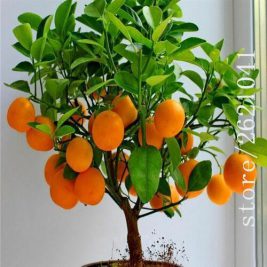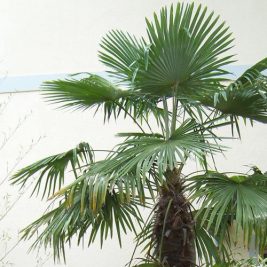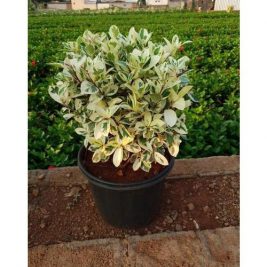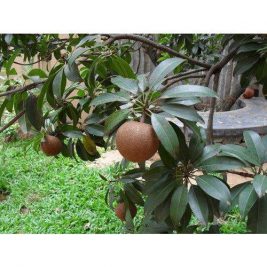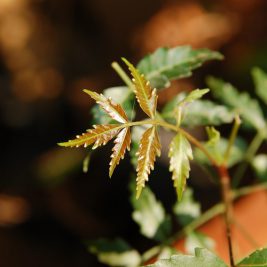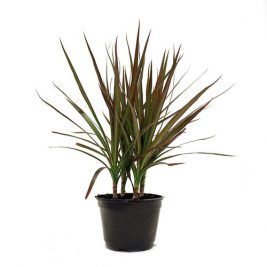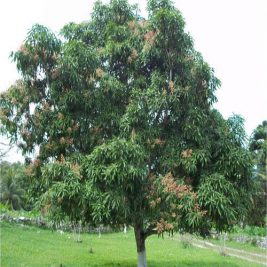Trees
-
₨2,699
Height : 1-2.5 ft
Pot Size: 12 inches
Adenium. Adenium is a genus of flowering plants in the Apocynum family, Apocynaceae, first described as a genus in 1819. It is native to Africa and the Arabian Peninsula.
f you want to grow it big in a pot, ensure that the plant has enough soil. In fact for proper growth, you must re-pot it in a large container. They do equally well whether these are kept outdoors or indoors.Keep soil moderately moist in spring and summer, but reduce watering in fall and especially winter when the plant is dormant.
-
₨1,999
Height 3ft- 5 ft
The oil palm tree (Elaeis guineensis jacq.) originates from West Africa where it grows in the wild and later was developed into an agricultural crop. … The oil palm plantations in Malaysia are largely based on the estate management system and smallholder scheme
-
₨1,999
Height : 1.5 ft – 4 ft
Guaiacum officinale, commonly known as roughbark lignum-vitae, guaiacwood or gaïacwood, is a species of tree in the caltrop family, Zygophyllaceae, that is native to the Caribbean and the northern coast of South Americ
-
₨1,800
Height around 1 ft.
Delonix regia is a species of flowering plant in the bean family Fabaceae, subfamily Caesalpinioideae. It is noted for its fern-like leaves and flamboyant display of flowers.
-
₨1,699
Height : 1-2.5 ft\
12-inch size pot
Adenium. Adenium is a genus of flowering plants in the Apocynum family, Apocynaceae, first described as a genus in 1819. It is native to Africa and the Arabian Peninsula.
f you want to grow it big in a pot, ensure that the plant has enough soil. In fact for proper growth, you must re-pot it in a large container. They do equally well whether these are kept outdoors or indoors.Keep soil moderately moist in spring and summer, but reduce watering in fall and especially winter when the plant is dormant.
-
₨1,499
Height 3ft- 5ft
Citrus × sinensis, also known as the Citrus aurantium, includes the commonly cultivated sweet oranges, including blood oranges and navel oranges
-
₨1,499
Height around 3ft- 4ft
16 inches pot
The Chinese fan palm, or fountain palm (Livistona Chinensis), is a hardy, slow-growing tree that derives its nickname from the fountain-like way its leaves droop down from the crown. Their leaves grow in circular, segmented fans, and develop spines when they’re young that they lose as they mature.
Chinese Fan Palm Care. Water: Water thoroughly then allow soil to dry slightly between waterings. Water less in winter when growth has slowed. Use filtered or distilled water because tap water may contain fluoride, chlorine and other chemicals that can damage palms.
-
Original price was: ₨1,500.₨1,300Current price is: ₨1,300.
Pot Size: 14 inches
Ficus is a genus of about 850 species of woody trees, shrubs, vines, epiphytes and hemiepiphytes in the family Moraceae. Collectively known as fig trees or figs, they are native throughout the tropics with a few species extending into the semi-warm temperate zone
-
₨1,300
Height around 1ft
Will be provided in plastic.
Manilkara Zapota, also commonly known as Sapodilla, Sapota, or Chikoo, is a long-lived, evergreen tree native to southern Mexico, Central America and the Caribbean. An example natural occurrence is in coastal Yucatán in the Petenes mangroves eco-region, where it is a subdominant plant species
-
₨850
pot size: 18 inches
Azadirachta indica, commonly known as neem, nimtree or Indian lilac, is a tree in the mahogany family Meliaceae. It is one of two species in the genus Azadirachta, and is native to the Indian subcontinent, i.e. India, Nepal, Pakistan, Bangladesh, Sri Lanka, and Maldives
-
Original price was: ₨999.₨799Current price is: ₨799.
Pot size: 16 inches
Dracaena (Dracaena marginata), also known as dragon tree, is an attractive, stiff-leaved plant with green sword-like leaves edged with red. The plant has narrow, slender gray stems that are topped with shiny, arching leaves that are sword-shaped.
-
₨599
Height around 1ft
Will be provided in Plastic
Mangifera Indica, commonly known as mango, is a species of flowering plant in the sumac and poison ivy family Anacardiaceae. It is native to the Indian subcontinent where it is indigenous. Hundreds of cultivated varieties have been introduced to other warm regions of the world.
-
Contact UsYou may connect with Team Greene at 0330-3450001
-
After SalesEven after Sales, Greene is there for you !!!
-
Return PolicyIf Product has a fault, Greene Returns *(T&C)

